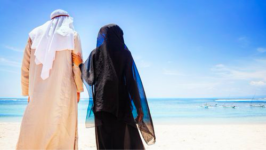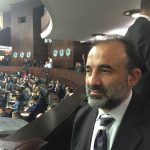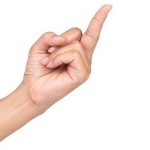Denmark Bans the Burqa and ‘Fake’ Beards

Denmark is not the first country to ban the burqa and niqab.
But the new laws, which were passed last week, also include a ban on “fake” facial hair, which has been seen as a convenient way to circumvent rules which prohibit police from stopping and searching people without a reasonable cause, and enabling them to unfairly target those of “middle eastern appearance”, especially men who wear the traditional Islamic beard.
Justification for the ban
The Danish government has not sought to justify the laws on the basis that a person might have a gun or bomb hidden under their burqa, or that face coverings (including fake beards) might be used to hide a person’s identity.
Rather, it claims to have enacted the legislation because “keeping one’s face hidden in public” is “incompatible with the values of Danish society or respect for the community… when meeting each other in the public space.”
Some commentators disagree, stating that the ban “isn’t really about clothing” but more “about the fear that immigrants might retain their non-Christian identities even while living in Western countries”. The Independent adds that:
“Slowly but surely, Europe is undergoing a move towards restricting religious freedom for non-Christians. The Danish government and media have focused on the burqa ban to get public consent, but the real issue is how minorities are being treated as second-class citizens”.
Penalties and commencement
The penalty for wearing a burqa or fake beard is 1000 Danish Krone, or $AUD207, for a first offence.
The level of fines increase incrementally, up to 10,000 Krone, or $AUD2,020, for a fourth offence.
The laws come into effect on 1 August 2018.
Impact of the ban
For devout Muslim women, the burqa ban could mean staying home if they wish to remain covered up –restricting their ability to work, socialise and fully integrate into the local culture, which many would argue is counter-intuitive to assimilation.
And as stated, the ban on “fake” beards would appear to achieve little more than give Danish police an excuse to arbitrarily stop men of “middle eastern” appearance.
Human rights group Amnesty International has been outspoken about the ban, describing it as a discriminatory violation of rights – including the right to practice ones religion and freedom of expression.
Countries that have already banned the burqa
In Austria, where it is estimated that less than 200 women wear the religious dress, police are grappling with enforcing the law – with reports saying that since its introduction, it has been used mostly for arresting people wearing clown disguises, cyclists and people wearing sports hoods, whilst devout Muslim women stay home.
France’s ban, which was introduced in 2010, has been widely enforced and has already been tested successfully in the European Court of Human Rights (EHCR). That case was brought by a French citizen of Pakistani origin, who wears both the burqa, covering her entire head and body, and the niqab, leaving only her eyes uncovered.
The woman’s lawyers submitted that outlawing the full-face veil was contrary to six articles of the European convention. They argued it was “inhumane and degrading, against the right of respect for family and private life, freedom of thought, conscience and religion, freedom of speech and discriminatory”.
The French government pointed out that the law was not aimed at the burqa or veil, but any covering of the face in a public place, and also applied to hoods and helmets when not worn on a motor vehicle. The European judges decided in the French Government’s favour, declaring that the preservation of a certain idea of “living together” was the “legitimate aim” of the French authorities.
In a separate case, the ECHR also upheld France’s ban on headscarves in educational establishments, and its regulation requiring the removal of scarves, veils and turbans for security checks.
Closer to home
In Australia last year, Senator Pauline Hanson caused national uproar when she wore a burqa to Parliament, calling for a public ban on the religious dress on the ground that it is a threat to national security.
In the wake of her stunt, a poll taken by Channel Nine suggested that almost 60% of respondents supported a ban.
However, the Australian Government has continually emphasised a need to work cooperatively with the Muslim community, not to make them feel offended and isolated because of their beliefs, and to support religious freedoms.
Islamophobia in Australia
There’s no doubt Islamaphobia is on the rise, globally and in Australia.
In Australia a large number of people are not in favour of the dress, not because they fear it, but because they see it as a symbol of oppression and sexism, contradictory to the freedoms Australian women have to dress as they like.
But the irony, and the reality, is that most Muslim women don’t feel this way – they are immensely proud of the garment and its significance to their faith.
If the true purpose of multi-culturalism is to create a society in which we can all live together and respect each other’s differences, then the challenge for law makers is to create laws which facilitate tolerance regardless of religion, ethnicity, age or gender, not to impose heavy-handed bans which offend and have the potential to isolate, alienate and discriminate against minorities.








